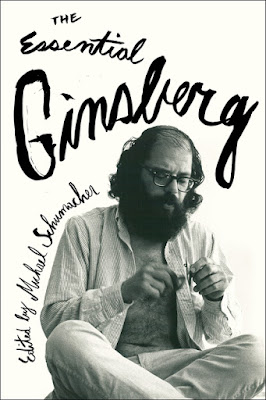The Academy of American Poets, on the occasion of his 89th birthday, gave Allen a tribute (the key component of which is this wonderful video of him and Steven Taylor on the rooftop of his East 12th Street, East Village apartment, in his final year, 1997, performing "A Western Ballad"("the first song I ever wrote"). This video was produced and directed byLeita Luchetti as a part of the Poetry Breaks. series.
More kudos for Allen, he was posthumously inducted, in 2015, (alongside Isaac Asimov, Dawn Powell, Francine Prose, Colm Tóibín, children's book authorEzra Jack Keats and New Yorker editor,David Remnick) into the august New York State Writers Hall of Fame
- and Allen also recently received his "sainthood" (according to Antinous, the Gay God)!
The "Please Master" debate continues - (as far-reaching as India, for example - to give just one example). Interestingly, David Freedlander's Daily Beast piece got reprinted in the pages of the local paper, The Hartford Courant (not without eliciting a vitriolic intemperate letter-to-the editor - re "The filthy poem, Please Master..." (sic))
Here's another brief survey/review of the whole brouhaha - So just who is it defining "obscenity"? - and why?
- from "Why Allen Ginsberg Matters" - Regina Weinrich on the Essential Ginsberg -
"Rereading "Please Master" in the light of these current events, with its poeticized yet truthful yearnings should affect a compassionate response to human desire, for touch, connection, penetration, and fulfillment. No revulsion here. How bewildering it is to find a poem's truth-telling language threatening when the hypocrisies of government officials are exposed, those who violate young people physically, secretly, while legislating against gay rights. And that's just one example. As Allen Ginsberg would ask, which is the true obscenity?"
Read more of ReginaWeinrich's Huffington Post article here
We're always on the look-out for these - Ginsberg encounters - here's "The Swede" (actually in England), recalling Allen's generosity at a book-signing in 1994 in New York
Speaking of generosity, here's a generous review of last week's Glass-Ginsberg Hydrogen Jukebox performance by the Long Beach Opera
Here's Kyle Gann's review of Philip Glass's autobiography in the New York Times
Hilary Holladay's Herbert Huncke biographygets a new cover and new edition
Read more about that book here
Paul Nelson's Memorial Day Interview with Joanne Kyger(featuring audio - and focusing on her new book, On Time) may be foundhere
Joanne's publisher, the indomitableLawrence Ferlinghetti is profiled (by NPR - "while he may have slowed down, he's still publishing three books (himself) this year") - here
One of those books (we've mentioned this before) being:














































































